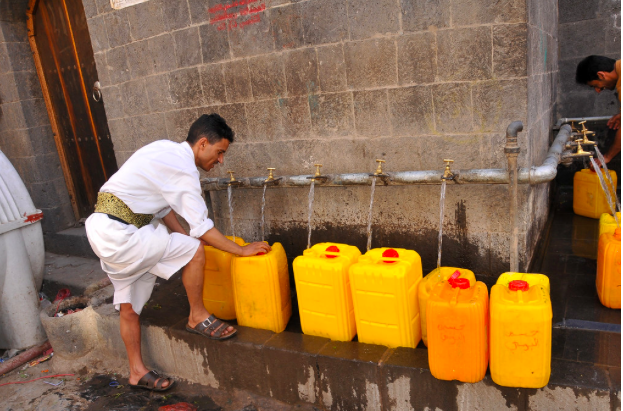As climate change continues to take its toll globally, Yemen has begun to dramatically feel its effects. The water shortages have significantly aggravated the scope of the conflict, and vice versa.
Locals Fill Bottles from Public Water Supply: Sana’a, Yemen. Water.alternatives. CC BY-NC 2.0$
Water scarcity in Yemen has become dire; 50% of Yemenis, nearly 15 million individuals, lack access to clean water, and experts have reported that the capital, Sana’a, runs the risk of consuming its limited water supply as soon as 2023. In 2017, a study noted the diminishment of the water table in Yemen by 6-7 meters per year. The rapidly-depleting water supply, coupled with limited access to available water represent just one of the many systemic issues facing Yemen that bear the potential to worsen significantly as a result of global climate change. As violence continues to escalate and humanitarian access to the crisis diminishes, Yemen increasingly lacks the tools it desperately needs to navigate a widespread cholera epidemic, as well as near-famine conditions for millions of its citizens.
Conflict in Yemen broke out in 2014 following a counterinsurgency launched against the government of Yemen by Houthi rebels. The civil war quickly became a proxy war between Saudi Arabia, who is leading a coalition in support of the established Yemeni government, and Iran, sponsoring the Houthis. The Saudi government has carried out frequent airstrikes against Houthi-held territory, which includes Sana’a, and has instigated a blockade, driving millions of Yemenis to the edge of famine. Climate change and conflict have been mutually-reinforcing in their exacerbation of the state of water scarcity, famine, and disease in Yemen. Diminished water supplies have intensified the stakes of factional conflicts, especially in Sana’a, while Saudi opposition to Houthi insurgency has, at least temporarily, cut short past collaboration between the two states to introduce Saudi water desalination technology into Yemeni infrastructure.
Compounding the issue, the average temperature in Yemen is predicted to rise 3.3°C by 2060. Moreover, Yemen has been in the throes of a cholera epidemic that has lasted nearly four years. Without adequate access to humanitarian healthcare resources or a sound healthcare infrastructure, and with the incubation effects that occur as global temperatures rise, disease outbreaks such as the current cholera epidemic stand only to increase, both in frequency and intensity.
Furthermore, as the conflict has rendered avenues for foreign aid from other nations and NGOs sporadic and inefficient, other groups with the aim of influencing Yemen’s population have begun to intervene. More specifically, the vacuum in humanitarian intervention has created openings for al-Qaeda recruitment among desperate members of the population, as the arm of al-Qaeda operating on the Arab Peninsula (AQAP) has performed services such as providing water and repairing wells. Given that the ultimate end of AQAP is recruitment, Yemeni affiliation with al-Qaeda will only further cycles of violence within Yemen and throughout the Middle East. Growing influence of AQAP has long-term destabilizing effects that will work against efforts to re-stabilize and recentralizes Yemen in the future.
Future efforts to stabilize Yemen will be fraught by both conflict and climate change, especially given the mutually-reinforcing feedback loop that has arisen between the two. Climate conditions have exacerbated the violence and displacement, and in turn the ongoing war has destroyed infrastructure crucial to dealing with emergencies in healthcare, access to water, and famine that have come about, in large part, due to changing climate conditions. Currently there are over 300,000 internally displaced persons, and experts contend that not only violence, but also the cholera epidemic and diminishing water and food supply have produced the massive amount of migration within Yemen. There has been hope, however, regarding the precedent water scarcity maintains for bringing adversaries to the conference table. Though, given the scope of the war and the state of human rights in Yemen, conflict and climate conditions may very well get worse before they get better.
HALLIE GRIFFITHS is an undergraduate at the University of Virginia studying Foreign Affairs and Spanish. After graduation, she hopes to apply her passion for travel and social action toward a career in intelligence and policy analysis. Outside of the classroom, she can be found, quite literally, outside: backpacking, rock climbing, or skiing with her friends.


